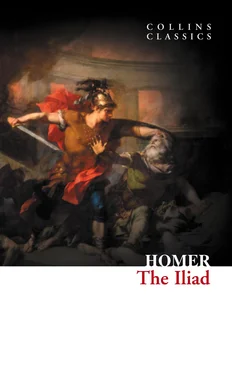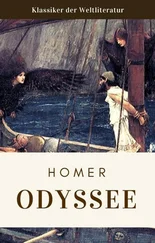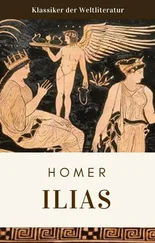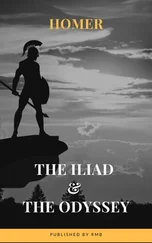Homer Homer - The Iliad
Здесь есть возможность читать онлайн «Homer Homer - The Iliad» — ознакомительный отрывок электронной книги совершенно бесплатно, а после прочтения отрывка купить полную версию. В некоторых случаях можно слушать аудио, скачать через торрент в формате fb2 и присутствует краткое содержание. Жанр: unrecognised, на английском языке. Описание произведения, (предисловие) а так же отзывы посетителей доступны на портале библиотеки ЛибКат.
- Название:The Iliad
- Автор:
- Жанр:
- Год:неизвестен
- ISBN:нет данных
- Рейтинг книги:5 / 5. Голосов: 1
-
Избранное:Добавить в избранное
- Отзывы:
-
Ваша оценка:
- 100
- 1
- 2
- 3
- 4
- 5
The Iliad: краткое содержание, описание и аннотация
Предлагаем к чтению аннотацию, описание, краткое содержание или предисловие (зависит от того, что написал сам автор книги «The Iliad»). Если вы не нашли необходимую информацию о книге — напишите в комментариях, мы постараемся отыскать её.
The Iliad — читать онлайн ознакомительный отрывок
Ниже представлен текст книги, разбитый по страницам. Система сохранения места последней прочитанной страницы, позволяет с удобством читать онлайн бесплатно книгу «The Iliad», без необходимости каждый раз заново искать на чём Вы остановились. Поставьте закладку, и сможете в любой момент перейти на страницу, на которой закончили чтение.
Интервал:
Закладка:
In all these objections we see nothing that contradicts his title to the honour of the chief invention: and as long as this (which is indeed the characteristic of poetry itself) remains unequalled by his followers, he still continues superior to them. A cooler judgment may commit fewer faults, and be more approved in the eyes of one sort of critics: but that warmth of fancy will carry the loudest and most universal applauses which holds the heart of a reader under the strongest enchantment. Homer not only appears the inventor of poetry, but excels all the inventors of other arts, in this, that he has swallowed up the honour of those who succeeded him. What he has done admitted no increase, it only left room for contraction or regulation. He showed all the stretch of fancy at once; and if he has failed in some of his flights, it was but because he attempted everything. A work of this kind seems like a mighty tree, which rises from the most vigorous seed, is improved with industry, flourishes, and produces the finest fruit: nature and art conspire to raise it; pleasure and profit join to make it valuable: and they who find the justest faults, have only said that a few branches which run luxuriant through a richness of nature, might be lopped into form to give it a more regular appearance.
Having now spoken of the beauties and defects of the original, it remains to treat of the translation, with the same view to the chief characteristic. As far as that is seen in the main parts of the poem, such as the fable, manners, and sentiments, no translator can prejudice it but by wilful omissions or contractions. As it also breaks out in every particular image, description, and simile, whoever lessens or too much softens those, takes off from this chief character. It is the first grand duty of an interpreter to give his author entire and unmaimed; and for the rest, the diction and versification only are his proper province, since these must be his own, but the others he is to take as he finds them.
It should then be considered what methods may afford some equivalent in our language for the graces of these in the Greek. It is certain no literal translation can be just to an excellent original in a superior language: but it is a great mistake to imagine (as many have done) that a rash paraphrase can make amends for this general defect; which is no less in danger to lose the spirit of an ancient, by deviating into the modern manners of expression. If there be sometimes a darkness, there is often a light in antiquity, which nothing better preserves than a version almost literal. I know no liberties one ought to take, but those which are necessary to transfusing the spirit of the original, and supporting the poetical style of the translation: and I will venture to say, there have not been more men misled in former times by a servile, dull adherence to the letter, than have been deluded in ours by a chimerical, insolent hope of raising and improving their author. It is not to be doubted, that the fire of the poem is what a translator should principally regard, as it is most likely to expire in his managing: however, it is his safest way to be content with preserving this to his utmost in the whole, without endeavouring to be more than he finds his author is, in any particular place. It is a great secret in writing, to know when to be plain, and when poetical and figurative; and it is what Homer will teach us, if we will but follow modestly in his footsteps. Where his diction is bold and lofty, let us raise ours as high as we can; but where his is plain and humble, we ought not to be deterred from imitating him by the fear of incurring the censure of a mere English critic. Nothing that belongs to Homer seems to have been more commonly mistaken than the just pitch of his style: some of his translators having swelled into fustian in a proud confidence of the sublime; others sunk into flatness, in a cold and timorous notion of simplicity. Methinks I see these different followers of Homer, some sweating and straining after him by violent leaps and bounds (the certain signs of false mettle), others slowly and servilely creeping in his train, while the poet himself is all the time proceeding with an unaffected and equal majesty before them. However, of the two extremes one could sooner pardon frenzy than frigidity; no author is to be envied for such commendations, as he may gain by that character of style, which his friends must agree together to call simplicity, and the rest of the world will call dullness. There is a graceful and dignified simplicity, as well as a bold and sordid one; which differ as much from each other as the air of a plain man from that of a sloven: it is one thing to be tricked up, and another not to be dressed at all. Simplicity is the mean between ostentation and rusticity.
This pure and noble simplicity is nowhere in such perfection as in the Scripture and our author. One may affirm, with all respect to the inspired writings, that the Divine Spirit made use of no other words but what were intelligible and common to men at that time, and in that part of the world; and, as Homer is the author nearest to those, his style must of course bear a greater resemblance to the sacred books than that of any other writer. This consideration (together with what has been observed of the parity of some of his thoughts) may, methinks, induce a translator, on the one hand, to give in to several of those general phrases and manners of expression, which have attained a veneration even in our language from being used in the Old Testament; as, on the other, to avoid those which have been appropriated to the Divinity, and in a manner consigned to mystery and religion.
For a further preservation of this air of simplicity, a particular care should be taken to express with all plainness those moral sentences and proverbial speeches which are so numerous in this poet. They have something venerable, and as I may say, oracular, in that unadorned gravity and shortness with which they are delivered: a grace which would be utterly lost by endeavouring to give them what we call a more ingenious (that is, a more modern) turn in the paraphrase.
Perhaps the mixture of some Graecisms and old words after the manner of Milton, if done without too much affectation, might not have an ill effect in a version of this particular work, which most of any other seems to require a venerable, antique cast. But certainly the use of modern terms of war and government, such as “platoon, campaign, junto,” or the like, (into which some of his translators have fallen) cannot be allowable; those only excepted without which it is impossible to treat the subjects in any living language.
There are two peculiarities in Homer’s diction, which are a sort of marks or moles by which every common eye distinguishes him at first sight; those who are not his greatest admirers look upon them as defects, and those who are, seemed pleased with them as beauties. I speak of his compound epithets, and of his repetitions. Many of the former cannot be done literally into English without destroying the purity of our language. I believe such should be retained as slide easily of themselves into an English compound, without violence to the ear or to the received rules of composition, as well as those which have received a sanction from the authority of our best poets, and are become familiar through their use of them; such as “the cloud-compelling Jove,” &c. As for the rest, whenever any can be as fully and significantly expressed in a single word as in a compounded one, the course to be taken is obvious.
Some that cannot be so turned, as to preserve their full image by one or two words, may have justice done them by circumlocution; as the epithet einosiphyllos to a mountain, would appear little or ridiculous translated literally “leaf-shaking,” but affords a majestic idea in the periphrasis: “the lofty mountain shakes his waving woods.” Others that admit of different significations, may receive an advantage from a judicious variation, according to the occasions on which they are introduced. For example, the epithet of Apollo, hekaebolos or “far-shooting,” is capable of two explications; one literal, in respect of the darts and bow, the ensigns of that god; the other allegorical, with regard to the rays of the sun; therefore, in such places where Apollo is represented as a god in person, I would use the former interpretation; and where the effects of the sun are described, I would make choice of the latter. Upon the whole, it will be necessary to avoid that perpetual repetition of the same epithets which we find in Homer, and which, though it might be accommodated (as has been already shown) to the ear of those times, is by no means so to ours: but one may wait for opportunities of placing them, where they derive an additional beauty from the occasions on which they are employed; and in doing this properly, a translator may at once show his fancy and his judgment.
Читать дальшеИнтервал:
Закладка:
Похожие книги на «The Iliad»
Представляем Вашему вниманию похожие книги на «The Iliad» списком для выбора. Мы отобрали схожую по названию и смыслу литературу в надежде предоставить читателям больше вариантов отыскать новые, интересные, ещё непрочитанные произведения.
Обсуждение, отзывы о книге «The Iliad» и просто собственные мнения читателей. Оставьте ваши комментарии, напишите, что Вы думаете о произведении, его смысле или главных героях. Укажите что конкретно понравилось, а что нет, и почему Вы так считаете.












